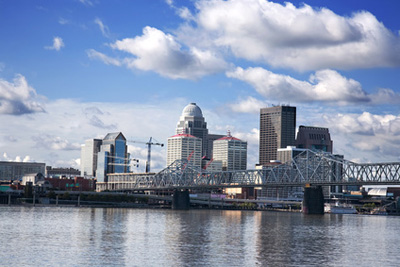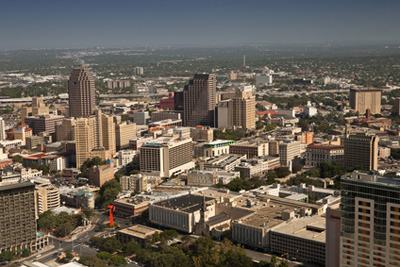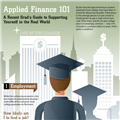Study: Best Cities for College Grads 2013
It's that time of year for young people across the country. Four years of all-nighters, parties, and racking up debt are in the past, and it's time to become full-fledged professional adults (and start paying that debt back). In this study, we offer a glimpse at the cities where new grads will have the easiest time, financially speaking, as they start the next chapter of their lives.
 |
Study Methodology
Looking at 50 of the largest U.S. urban areas, we considered three factors in determining the best places for newly minted college grads to begin their professional lives:
- Unemployment rate for college graduates
- The local wage premium for a college degree
- Cost of living
We started by looking at the unemployment rate for college graduates, based on data from the Bureau of Labor Statistics. Fortunately, for those who just spent a big chunk of time and money getting prepared for a job, it’s much lower for people with a bachelor’s degree than those without one: The cities we looked at saw an average rate of 4.4 percent in 2011, when the overall national unemployment rate stood at 8.9 percent. There is quite a lot of variation from city to city, though.
Next, we found the advantage that a bachelor’s degree provides when it comes to workers’ paychecks, based on our analysis of U.S. Census Bureau data. On average, in the major cities we considered, a four-year degree means 80 percent higher pay compared to someone with just a high school diploma.
While finding a job and getting a paycheck that rewards higher education levels are both important considerations for graduates, the spending side of the equation is equally crucial. The third factor in our rankings is each urban area’s cost of living. Cities where rents and other basic expenses are lower allow young people to keep more cash for paying off student loans, building up a financial cushion, and enjoying the local nightlife. We got our cost of living data from the consumer price index compiled by the Council for Community and Economic Research, which puts the average index number for the cities we considered at 108 (lower is better).
1. Indianapolis, IN
 |
| Indianapolis, Indiana |
- College Graduates’ Unemployment Rate: 1.9%
- Bachelor’s Degree Wage Premium: 73%
- Cost of Living: 87.2
The Midwest isn’t known as the most exciting place for young people, but Indianapolis has some big advantages over its coastal counterparts when it comes to attracting new graduates. The city has a jaw-dropping unemployment rate of just 1.9 percent for people with bachelor’s degrees, and its cost of living is the lowest on our list at 87.2. The city also offers a respectable wage premium of 73 percent for degree-holders. If you’re wondering whether the city is really a good place to spend your mid-20s, there are some local resources worth checking out, including the Young Active Professionals group and Young Professionals of Central Indiana.
2. Austin, TX
 |
| Austin, Texas |
- College Graduates’ Unemployment Rate: 2.6%
- Bachelor’s Degree Wage Premium: 89%
- Cost of Living: 95.5
This Texas city officially sells itself as the “live music capital of the world,” and the hometown of cultural draws like Austin City Limits and South by Southwest is also a great choice for young people with big career aspirations. The city’s unemployment rate for college graduates is just 2.6 percent — the third lowest on this list — and the premium for a four-year diploma is 89 percent. The city also boasts a below-average cost of living at 95.5.
3. Dallas, TX
 |
| Dallas, Texas |
- College Graduates’ Unemployment Rate: 3.6%
- Bachelor’s Degree Wage Premium: 89%
- Cost of Living: 91.9
To some of us, this city may still conjure up images of oil wells and big hats, but Dallas is a business powerhouse. The Dallas-Fort Worth metro area is the biggest population center in the South, with a serious financial and technology industry presence. The city also boasts an array of entertainment districts. When it comes to college graduates’ job prospects, they can expect a wage premium of 89 percent, and an unemployment rate of 3.6 percent. The cost of living is a relatively low 91.9.
4. Pittsburgh, PA
 |
| Pittsburgh, Pennsylvania |
- College Graduates’ Unemployment Rate: 3.2%
- Bachelor’s Degree Wage Premium: 89%
- Cost of Living: 91.5
The former steel-producing city has moved on from its industrial past to build a strong modern economy, with a particularly dynamic health-care industry. College grads get paid 89 percent more than folks who finished only high school, and their unemployment rate stands at a low 3.2 percent. The cost of living in the city is below average, although you wouldn’t know that from looking at the trendy restaurants, breweries, and performance venues showcased every month in Pittsburgh Magazine.
5. Louisville/Jefferson County, KY
 |
| Louisville, Kentucky |
- College Graduates’ Unemployment Rate: 2.8%
- Bachelor’s Degree Wage Premium: 71%
- Cost of Living: 87.7
Like Pittsburgh, Louisville is a poster child for the transition from an industrial to post-industrial economy. The former manufacturing center has brought high-tech employers and corporate campuses to town, and the impact shows when it comes to the numbers. The area has an unemployment rate of just 2.8 percent for college graduates, and a degree brings a 71 percent wage premium. That money goes further here too since the cost of living index is just 87.7.
6. San Antonio, TX (tie)
 |
| San Antonio, Texas |
- College Graduates’ Unemployment Rate: 3.6%
- Bachelor’s Degree Wage Premium: 96%
- Cost of Living: 95.7
Best known to tourists for the Alamo, San Antonio is just a couple hours from the Mexican border, and its large Mexican-American population gives it a different flavor from most big U.S. cities. Its wage premium for college graduates is the ninth-highest among the cities we looked at, and the unemployment rate for the college educated is just 3.6 percent. Its cost of living index level is also fairly low at 95.7.
6. St. Louis, Mo. (tie)
 |
| St Louis, Missouri |
- College Graduates’ Unemployment Rate: 3.5%
- Bachelor’s Degree Wage Premium: 76%
- Cost of Living: 90.4
This Missouri city is one of the most affordable major metro areas, yet it also offers cultural attractions from major museums and a famous symphony to one of the nation’s few free zoos. College graduates should have no problem finding work here, with the unemployment rate for people with a bachelor’s degree at 3.5 percent, and pay for the group is 76 percent higher than for less educated folks.
8. Richmond, VA
 |
| Richmond, Virginia |
- College Graduates’ Unemployment Rate: 2.4%
- Bachelor’s Degree Wage Premium: 69%
- Cost of Living: 90.8
Richmond residents with a college education have one of the lowest unemployment rates in the country at 2.4 percent, and they can expect to make 69 percent more than if they had only a high school diploma. High tech, financial, and insurance industries are big here, yet, as part of the Southeast, it’s a relatively affordable city. Young professionals in Richmond can network and get professional support from the local Chamber of Commerce’s HYPE, or Helping Young Professionals Engage, program.
9. Houston, TX
 |
| Houston, Texas |
- College Graduates’ Unemployment Rate: 4.7%
- Bachelor’s Degree Wage Premium: 100%
- Cost of Living: 92.2
The biggest city in the big state of Texas, and the fourth biggest in the U.S., Houston is quite affordable. It’s also a good city to have an education — Houston residents can expect to make twice as much money if they have a college education, one of the highest premiums in the country. Houston is a major center for the oil industry, but there are plenty of other strong sectors as well. The city’s attractions include not just the array of museums and restaurants you might expect from a big city but also unique destinations like Kemah Boardwalk, a hybrid of a waterfront dining district, a specialty shopping neighborhood, and an amusement park.
10. Milwaukee, WI
 |
| Milwaukee, Wisconsin |
- College Graduates’ Unemployment Rate: 3%
- Bachelor’s Degree Wage Premium: 86%
- Cost of Living: 101.9
Milwaukee employers are eager for young talent — so eager they’ve created an economic development initiative to attract and retain professionals. The city has an unemployment rate of just 3 percent for college graduates, and people with a bachelor’s degree can expect to make 86 percent more than those with just a high school diploma. The city’s cost of living is also a bit lower than average for a major city.
Of course, the city that’s best for any particular graduate will depend on what kind of job that person wants. For young people who want to keep their options open and are willing to go anywhere, they should look into which places are most likely to have opportunities available, and where they’ll be able to live a lifestyle they want while also keeping enough of their paychecks for those college loans.
No matter which city you end up in, though, there are ways to remain money savvy and make every dollar count. Check out the CreditDonkey Guide to Life After College for some helpful ideas.
Here are the sources we used to compile this study:
Livia Gershon is a contributing writer at CreditDonkey, a credit card comparison and reviews website. Write to Livia Gershon at livia@creditdonkey.com. Follow us on Twitter and Facebook for our latest posts.
Note: This website is made possible through financial relationships with some of the products and services mentioned on this site. We may receive compensation if you shop through links in our content. You do not have to use our links, but you help support CreditDonkey if you do.
